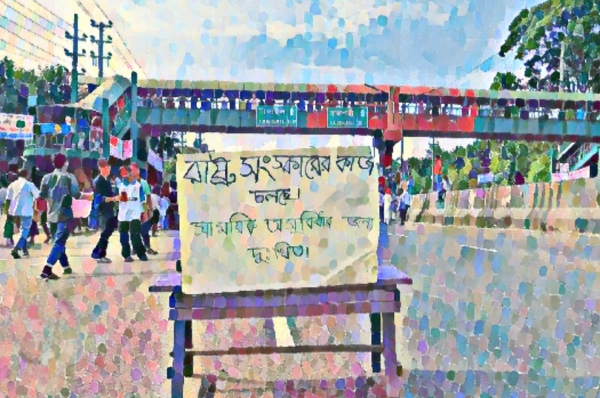To reform effectively, we must first grasp the full scale of Bangladesh's democratic decline under the Hasina regime..
-67121c1b336ef.png)
Read More
The body count from the July revolution continues to rise. A preliminary report from student coordinators indicates approximately 1,580 martyrs and 30,000 injured, with over 400 individuals permanently losing their eyesight.
Many have suffered amputations or disabilities, while others are paralyzed due to bullet injuries in their spines. These tragic events unfolded over just 20 days, from July 15 to August 5.
However, these figures only scratch the surface of the tragedy. The regime was prepared to inflict even greater violence. When their heavily armed police forces ran low on ammunition, they called in the military, intent on quelling the protests at any cost.
Initially, the army assessed the overwhelming support from the populace. Junior officers and troops expressed reluctance to fire on the protesters, and ultimately, the generals sided with the people.
Had they not done so, the casualties could have been catastrophic, possibly leading to a civil war.
The regime's brutality however begs the important question: how did such a repressive government rise to power in the first place?
There are many possible explanations, but my background in natural science and public policy draws me to the insights of neuroscience. Research suggests that human aversion to violence is not absolute; we object to violence perceived as unjust.
What constitutes "unjust" is shaped by individual values and biases, leaving ample room for manipulation and exploitation by those seeking power.
Typically, we feel outrage when victims are our family or friends, remaining indifferent to those we do not know. We may even feel satisfaction when our enemies are harmed and celebrate our victories, regardless of their brutality.
This instinct for survival has been exploited by perpetrators of genocide throughout history. The common strategy involves labeling certain groups as enemies, dehumanizing them, and ultimately justifying their extermination.
-67121bcb167b9.png)
Historical parallels: From Nazi
Germany to current conflicts
In Nazi Germany, Jews were labeled as the internal enemy, accused of various crimes including the death of Jesus, blood libel, and usury.
Today, Palestinians find themselves in a similar position. Israeli Defense Minister Yoav Gallant described them as "human animals" at the onset of the current war.
Since the conflict began, many in Israel have protested daily, calling for a ceasefire, government resignations, and actions to secure the release of hostages.
Most focus solely on the suffering of the hostages and their families, while few acknowledge the humanitarian crisis in Gaza, where over 42,000 have already died, with numbers continuing to rise. The destruction has rendered the Gaza Strip unlivable.
Reflecting on Bangladesh's history, Jamaat-Shibir were initially viewed as the internal enemy, labeled collaborators with enemy states.
Calls for violence against Shibir activists became socially acceptable among many intellectuals, academics, and cultural figures. The middle class rationalized this by granting leeway to judges and security forces in their pursuit of independence.
As mass arrests and brutal torture by police and the Rapid Action Battalion (RAB) became commonplace—often without proper legal procedures or accountability—families of victims were left in the dark about their loved ones' fates.
Live ammunition was used to suppress protests, and arbitrary arrests became the norm, with party offices shut down.
During this time, widespread violations of fundamental rights targeted Jamaat-Shibir activists, and to a lesser extent, members of the BNP.
Many in society remained silent, perceiving these actions as political squabbles with no impact on themselves. This apathy fostered a culture where security forces acted with impunity.
-67121bdbe4a38.png)
The gradual democratic backsliding
The erosion of democratic freedoms in Bangladesh didn't happen overnight. It began with targeted oppression, deceptively framed as necessary to control the defeated forces of 1971.
However, this granted unchecked power to security forces, who quickly exploited it, targeting anyone deemed inconvenient. Dissent was silenced with the label of "Jamaat-Shibir," stripping individuals of credibility and leaving security forces to operate with impunity. Lawlessness became the norm.
This pattern of oppression was met with disturbing silence from civil society elites and the middle class. They remained apathetic to the plight of madrasa students, who were conveniently otherized as radical Islamists, their concerns dismissed as irrelevant to the mainstream.
The 2014 elections marked a turning point. The deeply flawed electoral process, facilitated by complicit state institutions like the Supreme Court, police, military intelligence, and civil administration, disenfranchised every citizen.
Yet, the response from civil society was muted, and the general public remained largely passive.
This inaction stemmed from a pervasive belief that the Awami League was necessary to prosecute war criminals and a fear that any alternative, even a democratically elected one, would be equally corrupt.
This sense of political fatalism, coupled with the allure of a "megaproject economy" promising Singapore-style development, further eroded democratic values. Protests were framed as anti-development, and dissent was brutally suppressed.
We traded our fundamental rights for the illusion of progress.
The tragedy is that this polarization blinded many to the core issue: the absence of a democratically elected government. The debate was reduced to Awami League versus BNP and Jamaat, obscuring the fundamental question of legitimacy.
Even if Sheikh Hasina had won fair elections, the nature of governance would have been vastly different. A genuinely elected leader, even with multiple terms, could have fostered both democracy and development.
Instead, we find ourselves in a reality where both have been compromised.
Instead, we find ourselves under a regime that has eroded our citizen rights, stripped us of meaningful voting power, compromised our consent, and diminished our dignity. We have become subservient subjects under this authoritarian rule.
-67121ba4bdd16.png)
Debate surrounding the Awami League's
future
Many are questioning what to do about the Awami League (AL). Two main opinions have emerged. The first advocates for banning the party and holding its leaders accountable.
The second, more nuanced perspective calls for justice for Sheikh Hasina and her regime while recognizing that the AL is a large political entity with millions of supporters who were not involved in the July mass killings.
Belief in a political ideology should not be criminalized; we must punish the perpetrators, not the broader party membership.
Currently, it seems that the only AL is the one led by Sheikh Hasina. A painful reality is that many, if not the majority, of grassroots AL supporters do not express remorse or engage in soul-searching about the events of July and August in Bangladesh.
Instead, they are frustrated with the army for not inflicting more violence and blame India for not intervening with troops.
Daily, they await news of their leader's return. While it can be disheartening to see people willing to die for Sheikh Hasina, we must acknowledge that they are also citizens of this country.
Personally, I find some comfort in neuroscience, which offers insights into these complex dynamics.
The political landscape of any nation is typically comprised of diverse ideologies, with parties often aligning themselves along a spectrum ranging from left to right.
In Bangladesh, the post-1971 era saw a crisis within the right-wing, mirroring the challenges currently faced by the Awami League (AL) on the left.
General Ziaur Rahman played a crucial role in not only safeguarding multi-party democracy during this turbulent period but also in shaping the center-right by facilitating the rise of the Bangladesh Nationalist Party (BNP) to fill the void left by the decline of the Muslim League.
However, a comparable alternative for the center-left, capable of challenging the AL's dominance, has yet to emerge.
While the AL's future political trajectory remains in their own hands, the nation must prioritize securing justice for the victims of the July genocide. Achieving this solely through domestic mechanisms will be insufficient given the complexities of international law and geopolitics.
Therefore, it is imperative to pursue accountability through international legal avenues, such as the International Criminal Court (ICC) or the International Court of Justice (ICJ), with the backing of the United Nations.
This approach ensures that perpetrators are held accountable on both national and international stages, reinforcing the gravity of these crimes against humanity.

The reform question and geoscience
Furthermore, Bangladesh must embark on a path of constitutional reform to strengthen democratic institutions and ensure greater protection of individual rights.
This includes establishing robust checks and balances to limit executive power and prevent its abuse. Decentralization of the state structure is equally crucial, empowering local governance and promoting greater regional autonomy.
However, any interim government seeking to implement such sweeping reforms must be prepared to navigate the inevitable complexities and potential resistance that accompany such fundamental changes.
Just as geoscientists study the Earth's subsurface to identify zones vulnerable to earthquakes and volcanic eruptions, we must analyze the underlying factors contributing to political instability and social unrest.
While the "conditioning phase" for such events may be protracted and involve numerous variables, recognizing the warning signs and taking proactive measures can mitigate the potential damage.
By pursuing justice, strengthening democratic institutions, and fostering a more inclusive and equitable society, Bangladesh can build resilience against future crises and ensure a more stable and prosperous future for all its citizens.
This is because social and political upheavals, much like geological events, often follow a two-phase process. First, there's the long, simmering "conditioning phase" where underlying tensions and grievances accumulate.
This phase can last years, even decades, as inequalities widen, injustices persist, and the gap between the powerful and the powerless grows. This period is marked by a gradual erosion of trust and a growing sense of "us" versus "them."
Then, a "triggering event" occurs, often unexpectedly, igniting the pent-up frustrations and propelling society into a period of rapid and dramatic change. This is akin to the earthquake or volcanic eruption that reshapes the landscape after a long period of tectonic pressure.
The events of July 2024 in Bangladesh followed this pattern. Years of economic disparity, political marginalization, and cultural suppression created a fertile ground for discontent.
The realization that there were no "others," only "us" – all united in the struggle for self-determination – proved a powerful catalyst. The subsequent revolution, though devastating, was the necessary "triggering phase" that ultimately led to the re-birth of the nation.
Today, Bangladesh stands at a critical juncture. We must acknowledge that the path to a just and equitable society requires both reflection and action.
We must reject the divisive rhetoric of "us" versus "them" and embrace a shared national identity where every citizen is valued and protected. The state apparatus must operate within the bounds of law, upholding due process and ensuring accountability for all.
We must also recognize that lasting change requires patience and a commitment to rebuilding. The "triggering phase," while necessary for breaking down old structures, inevitably leaves wounds that need healing.
A comprehensive plan for reconciliation, rehabilitation, and reform is essential for navigating the aftermath and creating a foundation for a better future.
Freedom and democracy are hard-won and often messy. They demand constant vigilance, a willingness to engage in constructive dialogue, and a commitment to upholding the principles of justice and equality.
While the path forward may be challenging, there is no better alternative. By learning from the past and working together, we can build a Bangladesh that truly embodies the ideals for which so many fought and sacrificed.
—-
Dr Asrar Talukder is a senior research scientist in Australia

